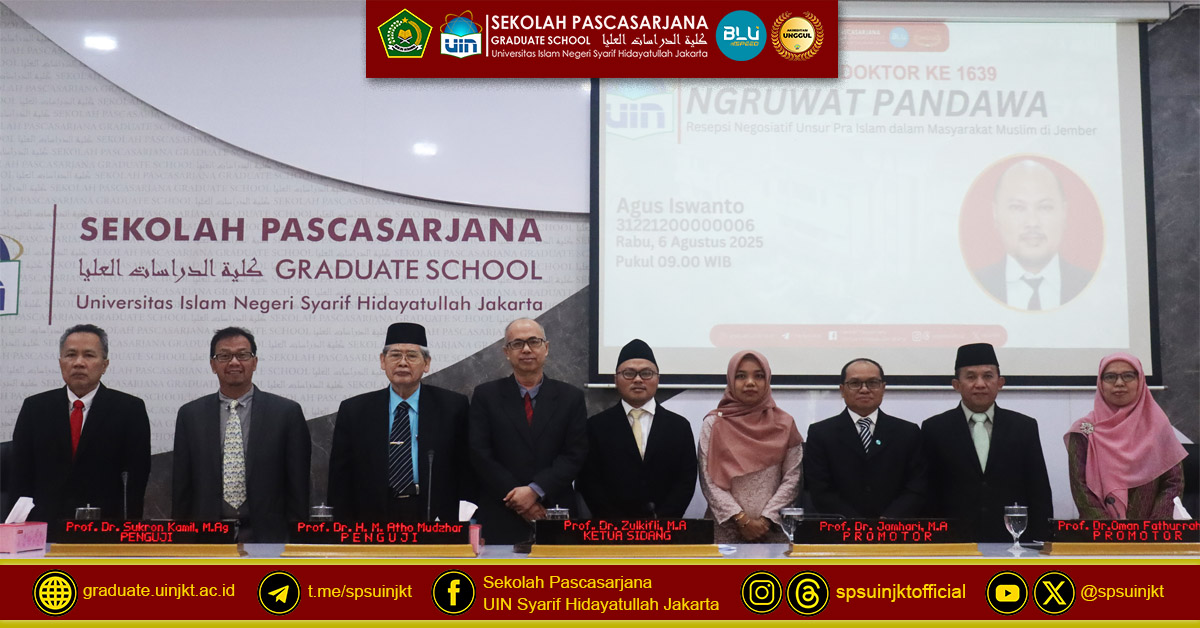Agus Iswanto's Doctoral Promotion Exam, Ngruwat Pandawa: A Negotiable Reception of Pre-Islamic Elements in the Muslim Community in Jember
Auditorium of Prof. Dr. Suwito, MA SPs UIN Jakarta, SPs NEWS: The Graduate School of the State Islamic University (SPs UIN) Syarif Hidayatullah Jakarta held the 1639th Doctoral Promotion Exam in the Auditorium Room of Prof. Dr. Suwito, MA SPs UIN Jakarta on Wednesday, August 6, 2025 with promovendus Agus Iswanto.
Agus Iswanto is a student of the Doctoral program in Islamic Studies with a Concentration in Philology. Agus wrote a dissertation titled "Ngruwat Pandawa: Negotiable Reception of Pre-Islamic Elements in Muslim Society in Jember". This study highlights how Muslim communities, especially in Jember, interact with ancient texts that have pre-Islamic elements.
This research has three main objectives. First, Agus Iswanto wanted to produce a textual criticism edition of the Ngruwat Pandawa (NP) manuscript. Second, he analyzes how the Pre-Islamic elements in this manuscript are accepted by the community. Third, he tried to explain the practice and understanding of the reading community, especially the Madura people in Jember, which was the background for the reception. Thus, this dissertation not only examines texts philologically, but also looks at their function in religious social life.
In his research, Agus Iswanto uses theories and methods of philology as well as literary reception, including intertextual and paratextual studies. The primary data used came from four NP manuscripts collected from communities in Banyuwangi, Jember, and Bondowoso. In addition, he also interviewed key figures involved in the practice of receiving NP manuscripts in Jember, East Java. This approach allows her research to combine textual analysis with an in-depth understanding of social and cultural contexts.
This dissertation resulted in some important findings. First, Agus Iswanto found that there are two versions of the Ngruwat Pandawa story that are used in the practice of the reading tradition and the rokat or ruwatan ritual. Both versions were found in four copies of the manuscript under review. Despite having two versions, both still contain Pre-Islamic elements. These findings suggest that the existence of such ancient elements is still preserved, albeit with different interpretations.
The second most interesting finding is the existence of a negotiated reception of Pre-Islamic elements. Agus Iswanto found that there are elements that continue unchanged, such as the Javanese ruwatan tradition and the names of the story characters. On the other hand, many elements are negotiated to be in accordance with the teachings of Islam. This form of negotiation includes writing a story of ruwatan in the Pegon script, adding a doxology that worships Allah and the Messenger, eliminating pre-Islamic mantras, and degrading the status of gods as creatures of Allah. In fact, Batara Guru is also described as a descendant of the Prophet Adam, and the teachings of the Islamic faith are inserted into the story.
The third finding explains the reasons behind this practice. The negotiation reception arose because the community considered the NP manuscript as an ancestral heritage that must be preserved, but at the same time they also tried to maintain the Islamic faith. In other words, the Muslim community in Jember is able to take care of old traditions while adapting them so that they do not conflict with their beliefs.
This dissertation makes a significant contribution to the study of Javanese manuscripts. If previously many studies focused on Islamic texts in Muslim society, Agus Iswanto's research actually examined how texts with pre-Islamic elements can live and function in a devout Muslim society. This refutes the general view that Islamic communities in Java and Madura are increasingly detached from pre-Islamic elements. On the contrary, this study shows that although Islam has taken root, elements of Pre-Islam are still accepted, but in a negotiated and selective way.
Agus Iswanto successfully defended his dissertation under the guidance of Prof. Dr. Oman Fathurahman, M.Hum; Prof. Dr. Jamhari, MA, and tested in front of a board of examiners consisting of Prof. Dr. Zulkifli, MA; Prof. Dr. Oman Fathurahman, M.Hum; Prof. Dr. Jamhari, MA; Prof. Dr. M. Atho Mudzhar, MSPD; Prof. Dr. Sukron Kamil, MA; Prof. Jajang Jahroni, MA, Ph.D.
After paying attention to the writing of the dissertation, the comments of the examiner team and the answers of the promovendus, the examiner team determined that Agus Iswanto graduated with the predicate of Cum Laude. Agus Iswanto is the 1639th Doctor in the field of Islamic Studies, in the doctoral program of the Graduate School of UIN Syarif Hidayatullah Jakarta. (JA)

